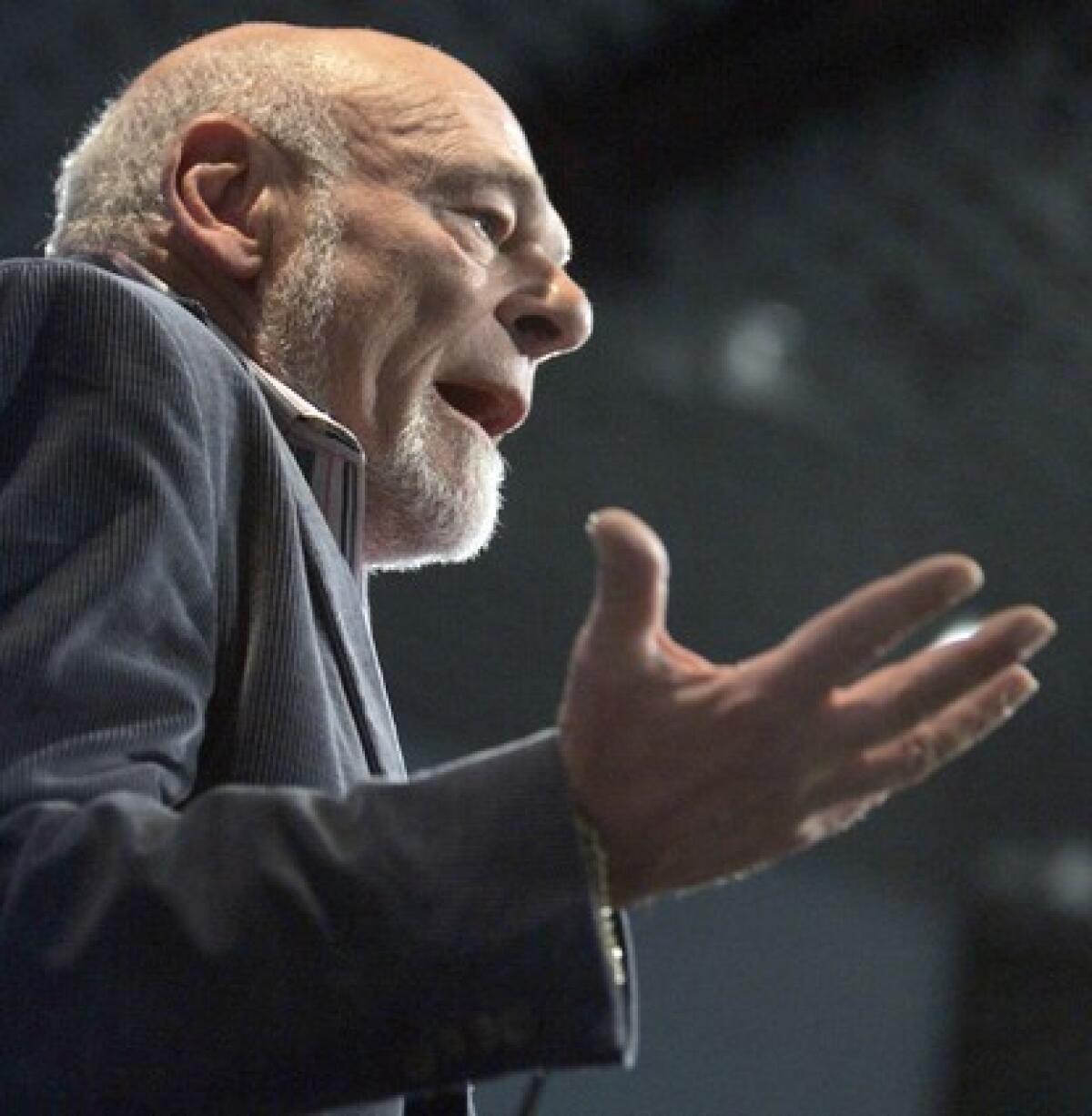For the love of God, Mr. President, don’t listen to Sam Zell

- Share via
Pro tip to President Trump: Don’t listen to Sam Zell.
The man who led my newspaper swiftly into bankruptcy in 2008, setting the table for the disaster known as Tronc, caught the president’s ear Wednesday in the usual way: by going on TV and supporting something Trump is doing.
In Zell’s case, it was praising Trump’s use of punitive tariffs on Chinese goods to try to wrangle major changes in that country’s mercantilist behavior. Zell, who made a considerable fortune turning around troubled properties and other investments, went on at length on CNBC’s “Squawk Box” on Wednesday about the need to be tough with China (and other countries) in order to level the trade playing field.
Trump shared a couple of excerpts with his merry band of Twitter followers:
Like Trump, Zell sees tariffs as leverage to help force China and Europe to abandon their own, unfair tariffs. But that overlooks a couple of lessons, one from history and one from this week.
The supposed tariff terrorism has largely been ground out of the system, thanks in part to the multilateral trade groups and treaties that the United States helped bring into being back when its leaders believed in such things. As data collected by the World Bank show, the average tariff on all imports globally has dropped to 2.6%, less than a third of what it was in 1994, and at least one order of magnitude lower than the tariffs imposed in the 1930s and 1940s. In fact, the U.S. now has higher average tariffs than several of its trading partners, including Mexico and Canada.
The Mercatus Center at George Mason University broke down the global average to see how levies differed across the range of economies. It found that protectionism increases as national income drops, with low-income countries averaging above 10% and high-income countries below 5%. But even low-income countries were cutting their tariffs until 2017, the year that Trump took office and promptly withdrew the United States from a proposed regional free-trade pact for the Pacific.
Put another way, U.S. leadership has been crucial in moving the rest of the world away from using tariffs as a blunt instrument against trading partners. We are now leading the rest of the world in the other direction, toward tariff terrorism.
Worse, it’s not clear what the president’s endgame is. What will happen if China doesn’t simply cave, as Zell believes it will?
Meanwhile, the damage to the U.S. economy is apparent. In August, Trump’s tariffs on Chinese goods, foreign-made aluminum and steel and a handful of other items finally caused U.S. manufacturing activity to shrink. The Institute for Supply Management’s survey of factories had shown decelerating growth for about a year, and in August the growth gave way to contraction.
Comments collected during the survey “reflect a notable decrease in business confidence,” the Institute for Supply Management said in its report. Why? The main answer is that new orders for their goods — and especially new orders from foreign buyers — dropped. That’s why trade remained manufacturers’ biggest concern, according to the ISM, which is no surprise, is it? The administration’s tariffs on imported metals and Chinese-made components have raised the cost of many U.S. made-products, and China and other countries have retaliated with tariffs of their own that hurt U.S. exports.
Despite his occasional confusion over who actually pays tariffs, Trump has understood for some time that trade wars inflict casualties. His operating assumption is that the United States is better able to tolerate the pain than China is, given how much less it has to lose from a rupturing of relations. China is much more reliant on exports, and it ships far more to the United States than the U.S. ships back. The president is also buoyed by the knowledge that the U.S. economy has been chugging steadily along while China’s growth has been slowing conspicuously.
So Trump seems committed to staying the course, no matter where it leads. In fact, he ratcheted up the tariffs on China on Sunday, imposing a 15% levy on an additional $112 billion worth of goods. And as long as U.S. consumers keep spending, our economy may be able to push through the trade headwinds.
I certainly hope they do, but it’s not a sure thing. As U.S. tariffs spread to more goods and the percentage charged increases, the trade war is hitting more consumer products and imposing an ever higher cost. So, too, is the damage to exports growing.
Zell isn’t worried about the potential backlash, nor does he seem perturbed by the contraction in manufacturing. “I think people won’t care because it will upset precedent as to what people are going to scream about or not scream about,” Zell said on CNBC on Wednesday. Just based on his tenure as owner of the L.A. Times, however, I’m not sure he can hear it when other people scream.
More to Read
A cure for the common opinion
Get thought-provoking perspectives with our weekly newsletter.
You may occasionally receive promotional content from the Los Angeles Times.










